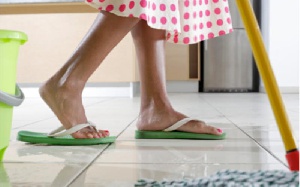- Home - News
- TWI News | TV
- Polls
- Year In Review
- News Archive
- Crime & Punishment
- Politics
- Regional
- Editorial
- Health
- Ghanaians Abroad
- Tabloid
- Africa
- Religion
- Election 2020
- Coronavirus
- News Videos | TV
- Photo Archives
- News Headlines
- Press Release
Opinions of Thursday, 15 June 2017
Columnist: Benedict Ocran
Expectations made and promises unfulfilled; the unsung plight of the Ghanaian maid
In recent times, the media terrain has been awash with discussions on the traumatic situations some of our young women go through as maids in some Middle Eastern countries.
The situation is indeed disturbing, considering the long term psychological implications it has on the lives of these young women.
As unfortunate as this trend may be, it is being replicated right here in Ghana through a system that is so informal that its implications, I daresay extremely damning misses the purview of our society- the recruitment of young women as house helps by the middle and upper class to aid in domestic duties from the less privileged and poor in society.
For many reasons, mostly stemming from busy personal and work schedules, families and individuals dotted across cities and towns in Ghana seek consultations with social networks such as extended family members, friends and acquaintances for recommendations on young girls from usually poor backgrounds to aid in taking care of children of families in addition to similar chores such as taking care of shops etc.
It may be out place to totally condemn such arrangements-for instance some of these young people have the opportunity to complete basic and secondary levels of education alongside these domestic responsibilities they are tasked to fulfill when brought to towns and cities.
Again, the exposure alone does a lot to the social wellbeing of the young woman, just to mention a few.
Rather, some of these young people with initial expectations of a better life after such servitude, such as some form of lifelong skills including certain levels of formal education, or forms of trade are not rewarded their due after long periods of service.
It could be argued that if it was the case of striving to learn a trade, families could garner resources to aid such young people learn a skill in their own villages. This argument may be dispelled by those who may suggest that these families do not possess enough resources to aid young people gain such skills or education, hence the decision to push young people into servitude.
So let’s discuss the situation of house helps in other terms and I am going to try to discuss this systematically from the period of engagement till end of contract (I term it so because that is what it should be).
First off, what prevents families giving off of their young people as house helps to agree with those going to be served on a form of monthly monetary compensation? I believe this is highly important considering the kind of work these young people do on a daily basis and the period with which such services are rendered.
Even more important is the need to engage the views of these young people engaged on the amount to be remunerated and the details about how such savings will be executed. Obviously, the families or individuals contracting the help of these young people may argue that such monies are kept in their own savings, for delivery upon expiry of contract.
However, as such an arrangement may be abused by unscrupulous beings in the end, to the detriment of the house help, the arrangement should be such that an adult from the perspective of the young girl being giving out should be privy to some form of periodic evidence on the supposed savings being done by the family contracting to ensure that, agreements are upheld, also to satisfy the contribution of the young person being engaged. This discussion could be within the purview of minors engaged as house helps.
In the case of adults, perspective house helps above the age of 18, should be given additional choice on how such agreed amounts should be paid, albeit within the confines of well-informed discussions on how such payments should be saved or applied.
Again, what prevents house helps contracted from enjoying opportunities to continue their education, especially primary or even secondary to gain the necessary numeracy or literacy skills which are such important contributions to breaking the cycles of poverty? This may seem impossible considering the schedule of some of these house helps, but how about creating such opportunities after some periods of service?
How about engaging the services of other house helps so that those who have completed a period of service can undergo certain forms of education which doesn’t have to necessarily only fall within the remit of formal education?
It will be so ill informed for anyone to suggest that such house helps are not capable of undergoing basic education, even on the basis of their prior performance back in their villages. After all, do we forget that the performances of such of young people, including house helps contracted from the villages are but a reflection of the inadequate conditions under which they study? And even more, is the purpose of the school not to identify the abilities and capabilities of the student and by this help them to study?
Please, it is very possible for house helps to be educated and avenues should be created for such.
It is also very important that house helps are given the opportunity for periodic contacts with families back home. This does a lot to reassure them psychologically, amidst the strenuous work conditions they sometimes face.
House helps should be given the opportunity to call back home, find out about the wellbeing of others and discuss wellbeing with others back home. House helps should be able to show love to family members back home and be shown love back, and not made to stay away from such familial contacts over long periods of time.
Similarly, adult family members of house helps should be given the opportunity to visit their young family members engaged as house helps to ascertain their health and wellbeing and again provide systematic feedback to others back home.
Of course, all these discussions I have just put forward require the involvement of stakeholders, most important policy makers who have a stake in the health and wellbeing of our young women and girls in the society.
There is the need for a national conversation on the situation, also considering the sometimes traumatic experiences house helps go through to avert such occurrences as the Ugandan maid who beat a toddler to pulp
(http://www.dailymail.co.uk/video/news/video-1138452/WARNING-GRAPHIC-CONTENT-Nanny-mercilessly-beats-toddler.html ).
Therefore, I call on the Ministry of Gender and Social Protection, Civil Society Organizations, Religious-Based Organizations and all interested parties to set in motion a series of conversations geared towards enhancing a legal framework for the protection of the rights and responsibilities of house helps in Ghana.
We, as Ghanaians already have the prerequisites as embedded in the Children Act, 1998 (Act 560) which draws its international commitments from the UN Convention on the Rights of the Child (Ghana was the first country to ratify in February 1990), and which envisages that children should be protected from the worst forms of child labor.
Finally, I call on all academics with research interests in gender issues to collaborate on research inquiries into the phenomenon of maids in Ghana which silently threatens the health and wellbeing of our underprivileged and poor young girls in Ghana.
Entertainment










